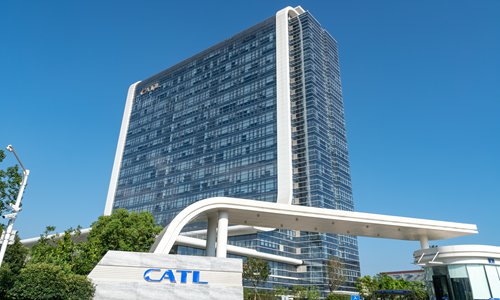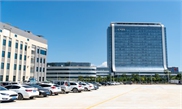What did Hungary do right when it received the 'biggest ever investment in its history' from China?: Global Times editorial

A view of CATL headquarters in Ningde, East China's Fujian Province Photo: VCG
Contemporary Amperex Technology Ltd (CATL), China's biggest electric vehicle battery maker, announced it would build a 7.34-billion-euro (50.79 billion yuan) battery plant in Hungary. Once built, it is set to be Europe's largest battery cell plant. Hungary said that it will be "the biggest ever greenfield investment in the history of Hungary." Some foreign media claimed Hungary got the "biggest ever investment in history" because of "supporting China," which is a bit sour: While verbally saying "No," they have paid high attention to the investment trends of the Chinese companies.
Why did Hungary attract investment from CATL? Anyone with discerning eyes can tell that this is a perfectly normal business decision. The geographical location in the heart of Europe, with a good industrial support base, allows Chinese companies in Hungary to be closer to their European customers and be able to respond to their needs in a timely manner. More critically, Hungary offers Chinese companies predictability in terms of policy and business environment. Hungary, the first country in Europe to sign Memorandum of Understanding with China on jointly building the "Belt and Road" Initiative, has offered Chinese companies a lot of preferential policies for their investments. As a result, the number of Chinese companies investing in Hungary has continued to increase over the past two years. The scale of investment has also remained high, with bilateral trade between China and Hungary increasing by 34.5 percent year-on-year in 2021. Not long ago, NIO, a Chinese electric-vehicle maker, announced its first overseas factory in Hungary, and in June Lenovo put into operation its first European manufacturing facility in the country.
Some foreign media jealously claimed that Hungary has harvested huge investment for "supporting China in the long run." With this effort, it's better to deeply reflect on why CATL has postponed its plans to build a plant in North America. For a long time, the US has been the country that attracts the most foreign investment. But over the years, under the poisonous atmosphere of pan-politicization and generalization of concept of security, the country has created many terrible precedents, making more and more originally rich investment soil into a minefield. For example, it has forced foreign high-tech companies to hand over their technology and even carried out "technical confiscation" of capital, leading many people to say that Washington is close to "open robbery." Can a company develop at ease if it is constantly worried about its investment and if it might be confiscated one day or waste all its investment? According to US media reports, CATL has long been planning to build US battery plants and visited some places in the US, but eventually may choose alternative plan to build plant in Mexico. It should be said that the doubts of CATL are also those of many other companies.
Over the past decades, China has been among those who have benefited from economic globalization the most and contributed to it the most. In this process, Chinese companies that have been investing and expanding their business overseas contributed a lot. CATL's plants in Hungary will undoubtedly benefit the development of EVs in Europe. However, there are "Atlanticists" who interfere with Europe's pragmatic and rational cooperation, as well as US and Western politicians obsessed with "values-based diplomacy." We want to say that these people should introspect themselves, realizing that they should no longer look at Chinese investments through a particular lens. When a series of political provocations and de-couplings continue to poison the atmosphere of bilateral trust and cooperation, no company in the world will come to invest, facing the risk of becoming the next target of brutal crackdown and suppression. If one nation keeps using such political means to restrict economic behaviors, it will only counter the general trend of economic globalization. The truth is as simple as that.
CATL chose Hungary to build a factory this time. It's an isolated case, but also a phenomenon with wider and inspiring significance. As some European and US forces are increasingly clamoring to scrutinize investment from China through political lens, Budapest insists on being rational and pragmatic, not blindly following and avoiding its own national interests to be hijacked by others' political motivation and bear unnecessary price for it. The stability and predictability of its investment environment has paid. Hungary's ambassador to China said that Hungary is proud to be the "main entry point" of large Chinese enterprises into Europe. Healthy and steady China-Europe relationship, including trade relationship, is conducive to both sides and the world. The two sides should meet each other halfway to promote trade cooperation, including providing more "entry points" for Chinese enterprises to enter Europe, and connecting the dots.

